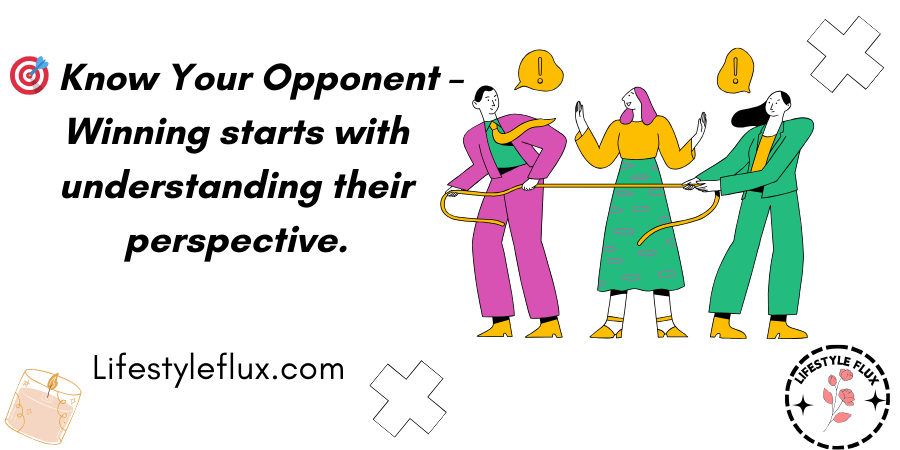Arguing isn’t as easy as it looks. Even if you know more or understand the subject better, someone can still argue circles around you. Because it’s not all about how many facts and figures you can rattle off.
A good argument requires more than a little bit of convincing evidence. Especially when you’re arguing face-to-face, that’s actually where most people have trouble.
In-person disagreements with coworkers, friends, or even family are some of the most difficult arguments to win. Think about it. If you have time to mull over your points, isn’t it much easier to construct a sound argument?
You don’t have to worry about being interrupted. You avoid any rebuttals or counters. You can think clearly and keep your head straight.
But, in the heat of the moment, arguing gets a whole lot harder. Emotions flare on both sides. Your points are muddled by all kinds of exaggerated claims that no one can really remember.
To make matters worse, most face-to-face arguments are filled with misunderstandings. You don’t have the time or space to think, so you instinctually react to the first things you hear.
You may not have processed their actual point, but that misunderstanding can instantly derail the entire argument. As arguments get more confusing, you probably get annoyed.
You have more and more trouble consolidating your ideas. By the end, it might feel like the person who yells the loudest wins. So, how do you keep your arguments from spiraling into a frustrating mess?
What strategies will help you quickly and effectively say what you want to say? To answer those questions, let’s dive into 7 simple tricks you can use to excel in any argument.
Table of Contents
1. Know Your Opponent
To win an argument, you have to understand your opposition. It sounds strange, but it’s an incredibly helpful trick, especially when arguing with someone who knows their stuff.
No matter where you are or who you’re talking to, one thing’s certain. You know your perspective better than you know theirs. You’ve thought about your side. You’ve lived with it.
You may have argued for it a few times before. If it’s something you’re truly passionate about, you might also have a physical or emotional connection that makes your perspective important to you.
In your mind, that carries a lot of weight. It seems to matter so much more than any case your opponent could make. But consider this. Your opponent likely feels the same way about their side of the story.
They’ve given it thought. They’ve invested emotions. Their perspective may have, in some way, affected who they are. To them, your opinion doesn’t even come close.
This might seem obvious to you now, but people rarely stop to consider it. Someone else’s argument may be just as thorough and valid as yours. If you want to win, you need to understand where their argument is coming from.
How does it make sense? Why does your opponent believe in it? By considering these questions, you understand why they’re even bothering to argue with you because people don’t argue for no reason.

Just like people don’t choose their opinions at random. There’s always some emotion or connection hiding underneath. So, how does this help you win any debate?
First of all, it keeps tempers from rising. But it also shows you the best way to structure your argument. Let’s say someone is adamantly defending a certain group of people.
You realize it’s because they feel a sense of community with them. Obviously, criticizing or attacking their group isn’t going to change their mind. It’s just going to make them mad.
Instead, you might argue that they could find that sense of community elsewhere. This kind of argument is much more likely to strike a chord with your opponent.
But you only know that because you took the time to consider their perspective.
2. Dissolve Absolutes
An absolute is a statement like, “All people wear shoes.” It’s when you phrase something as a definitive, all-inclusive fact. We mostly use absolutes to exaggerate a strong point.

And they usually sound right when you first hear them. But it doesn’t take long to realize how untrue most of them really are. If you argue using absolutes, you’re setting yourself up for failure.
People will find exceptions to your rule and force you to backtrack. You’ll spend a good chunk of the argument trying to justify an absolute, even though you didn’t need to use one in the first place.
3. Create Relation
We naturally latch onto issues that directly relate to our own life. When problems feel closer to home, we’re more interested in and passionate about resolving them.
That’s just the way the brain works. Luckily, you can use this knowledge to your advantage in an argument. To get your point across, discuss how your perspective relates to their life.
How would it affect their neighborhood? Their job? Their family? Focusing solely on your own experiences makes it much harder for them to connect to what you’re saying.
Try to show them why your argument plays an important role in their life. You’ll find you’re a lot more convincing when your opponent can honestly relate to your side.
4. Show Flexibility
Your opinions should be flexible during any argument. If your opponent makes a good point, they must know you’re willing to acknowledge their ideas. Otherwise, why are they even arguing with you?
Why not just agree to disagree? If you’re both dead set on maintaining your views, a debate won’t get you anywhere. You could both make dozens of convincing arguments, but it wouldn’t matter.
No one is willing to learn anything. Neither of you want to gain any new knowledge. You want to win. More often than not, inflexible people aren’t even listening to your words.
They’re just waiting for their chance to speak. But being flexible will help you win more arguments. It encourages your opponent to give you the same courtesy. It works like this.
When you acknowledge their opinion, they immediately feel heard. People often feel frazzled and insecure when they argue. They’re constantly scrambling to get their point across.
So, by agreeing with and validating their perspective, you’re telling them they’re making sense. They don’t need to worry about sounding stupid; it’s a small change that dramatically affects their attitude.
They’ll feel calm and open to learning something new. That means they’ll be much more receptive when you argue your side. In the end, very few arguments are 100% dominated by one point of view.
Parts of your perspective will be right, and parts of theirs will be too. It’s about finding common ground.
5. Nothing Personal
Don’t make things personal. The last thing you want to do is use insults or criticisms to win an argument. Once you cross that line, it immediately turns a friendly debate into an actual conflict.
The end goal of any argument should be to resolve the problem without damaging the greater relationship. Sure, you want to prove your point. However, friends should be able to argue without putting their entire relationship on the line.

Insults also completely undermine your argument. When you resort to attacking someone’s character, it tells your opponent you have nothing left to say.
Imagine you try to invalidate a good point by calling someone stupid or narrow-minded. Does that actually prove anything? Of course not.
They’ll think you couldn’t think of an actual counter-argument, so you just tried to hurt them instead.
To make matters worse, you’ll spend the rest of the argument on the back foot. And that’s assuming your opponent even wants to keep talking to you.
If you don’t want to damage your relationships or undercut your own opinions, stop yourself from getting personal. The longer you can do that, the better your argument will be.
6. Admit Uncertainty
There are three words that no one wants to say in the middle of a heated argument. Those words are “I don’t know.” Admitting you aren’t sure about something can feel like a loss.
Like you’re telling the other person they’ve bested you. People are so determined to avoid it that they’ll misconstrue facts or suddenly change topics.
They’re trying to keep the power in the conversation, but there’s nothing wrong with admitting you don’t know. You’re allowed to be unsure.
All those misquoted facts might sound good at the moment, but it makes for a weaker argument in the long run.
7. Avoid Competition
We’ve talked a lot about winning arguments but didn’t ask ourselves a simple question. What does it really mean to win? People often compare arguments to fights.
Two individuals battle it out in a fight, giving everything they’ve got until one person comes out on top. Fights have clear winners and clear losers. And both sides will stop at nothing to ensure they’re the last ones standing.
If you come into a discussion with this competitive mindset, your arguments will almost always turn into fights.
No one will grow from the experience. No one will leave the argument feeling good about themselves. Even if you win, any feelings of pride will drown under a wave of guilt and leftover frustration.

So, let’s rethink the ultimate goal of an argument. What do you really win by making the other person feel bad about their beliefs? Nothing. In fact, you both lose.
The goal of an argument should be to get a better understanding of the world around you. Whether or not their original points were accurate, the person who learns the most is the real winner.
Don’t start an argument to prove you know what you’re talking about. Do it to expand your horizons. Grasp new perspectives and strengthen your beliefs.
Conclusion:
Winning an argument isn’t about proving someone wrong—it’s about making your point in a way that resonates. If you go in with the mindset of crushing your opponent, you’ll miss the bigger picture.
Arguments aren’t battles to be won or lost. They’re opportunities to learn, persuade, and refine your perspective.
By understanding your opponent, staying flexible, and keeping emotions in check, you turn any debate into a meaningful exchange.
That’s how you genuinely win—not by overpowering the other person, but by walking away with greater insight and influence.
Sources:
https://www.psychologytoday.com/us/blog/fulfillment-any-age/201408/6-ways-win-any-argument
https://time.com/5318965/how-to-win-an-argument
https://www.bbc.com/future/article/20140521-the-best-way-to-win-an-argument
https://medium.com/behavior-design/the-trouble-with-trying-to-win-at-everything-4852897b0743
https://www.psychologytoday.com/us/blog/fulfillment-at-any-age/201806/10-ways-to-win-any-argument

Founder and CEO of Lifestyleflux.com, I bring years of expertise in self-improvement, wellness, and personal development to help you lead a happier, more balanced life. Through practical insights, eBooks, and consultations, I share actionable strategies rooted in experience and a passion for empowering others to unlock their full potential.

